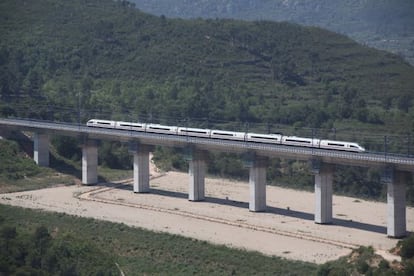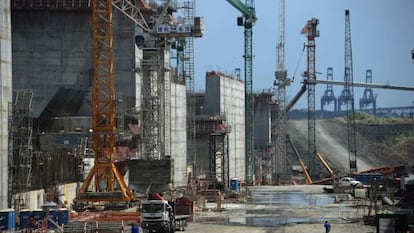Overrun costs or corruption? Why Spain’s public works are in crisis
In six years, the government has paid out €10bn to cover excess spending on construction projects The amount is equivalent to the cuts it made on health and education when it came to office Arrests of nine on embezzlement charges provide latest example of an overly abused process

The 413-meter-long bridge spanning the Candí ravine in Catalonia is impressive, rising 60 meters above the ground in this barren, rocky stretch of the Barcelona-Madrid AVE high-speed train route.
But as Manuel Melis, one of Spain’s top railway engineers, points out, there is a problem. A serious problem. “We call it the ascending viaduct, like our Lord. It’s the first viaduct in the world that instead of sitting plugged into the ground at the level it was built, has grown in height.”
The bridge, which lies close to the village of Montblanc, in Tarragona province, was opened in 2003, and soon after, its gradual but unstoppable ascent became clear: “It was easy to see; we’re not talking about a few millimeters, it rose by 40 centimeters, meaning that the train had to slow down to 80 kilometers an hour to cross it,” says a geologist who works for the civil service and asked not to be named.
The pillars holding the bridge up are built on foundations of anhydrite and gypsum, which expand when they come into contact with water. The cost of solving the problem of the ascending bridge was €43.5 million. “A huge amount of earth had to be removed to prevent the anhydrite from hydrating and the bridge from continuing to rise,” says Melis. The valley floor was filled with 1.4 million cubic meters of soil, along with vast quantities of cement, to strengthen the foundations. Nobody at the engineering division of the Public Works Ministry, Ineco, wanted their name associated with the job.
This kind of event might have generated some kind of criticism or debate in other countries. But not in Spain, it seems, where cost overruns in public works projects are a fact of life. The 621-kilometer Madrid-Barcelona high-speed rail link ended up costing €9 billion, 31 percent more than the estimated budget. Last week nine people were arrested and now face corruption charges related to contracts on four stretches of the route.
Between 2008 and 2014, the Public Works Ministry has paid out €5.12 billion to modify already completed works. A further €4.1 billion has been paid to cover cost overruns, along with €900 million for expropriating land. In total, over the last six years, the Public Works Ministry has had to find more than €10 billion to cover cost overruns on roads, rail and ports, the same amount that Prime Minister Mariano Rajoy announced he would be cutting from health and education spending in April 2012, shortly after he took office.
There are any number of examples: the new port complex at A Coruña was tendered in 2004 for €436 million, and then awarded later that year for €370 million, according to Spain’s Ports Authority. The job ended up costing €547 million. And more money will be required, with the final cost likely to be more than €700 million.
The Environment Ministry, the government’s other big public works spender, paid out €1.5 billion in cost overruns between 2004 and 2012 on desalination plants, dams and other projects.
The extent and level of Spain’s overruns has caught the attention of the European Commission
In large part, the problem lies with the way these kind of large-scale infrastructure projects are organized. In simple terms, this is how Spain’s tendering and adjudication system works: the government commissions a consultant to design a project, and then puts it out to tender to the big construction companies. These put in very low bids and win. They then “rip the project apart, finding all sorts of faults and problems, and demanding all kinds of modifications to get their money back and then some,” according to one civil engineer with experience of the system.
Leonardo Benatov, president of Euroconsult, says that another problem is that projects are put together too hastily. “In 2000, they drove us crazy. Everything was needed for yesterday. Projects that would have normally taken a year for a serious geological survey were banged out in six months.” But Julián Núñez, president of Seopan, the builders’ confederation, says that construction companies cannot be blamed if the politicians later change their minds about a project, or special interest groups or local communities demand changes for environmental reasons.
On other occasions, though, construction companies have pushed through changes to projects that the government of the day has accepted so as not to delay work. In relation to last week’s arrests, the Audit Office says that changes were made on the Barcelona-Madrid AVE route, even though the Public Works Ministry recommended halting work to assess the recommendations.
When a job is finished, prices are then revised, with margins built in that allow for the price to be increased if the cost of materials has risen, and the project is settled, which involves the work being checked to see if more has been built than foreseen. This approach, coupled with emergency costs, is what drives up costs. Until 2011, the maximum overrun was 20 percent on the job and 10 percent on the settlement payment. Seopan says that complementary work and price revisions should not be regarded as overrun costs.
There will always be some overrun, because it is impossible to present the perfect project”
The most expensive and difficult stretch of Spain’s high-speed rail network will link the mountainous region of Asturias with the Madrid-Valladolid route, and involve the construction of four tunnels. The tender was put out at €1.6 billion, and finally adjudicated for €1.8 billion. But between 2004 and 2011, the cost rose by 1.2 billion due to a range of problems encountered once work had begun.
The Public Works Ministry says that Spain is not alone in having overrun costs, citing the cases of the Channel Tunnel and Berlin’s new airport. But the extent and level of Spain’s overruns has caught the attention of the European Commission, which sent officials to discuss the issue with Spain’s Public Works Ministry. The EU pumped €30.1 billion into Spanish infrastructure between 2004 and 2013. “They were very tense meetings. They didn’t understand that all big projects funded by the EU went over budget. At the same time, Spanish construction companies were beginning to buy businesses overseas,” says a source at the Public Works Ministry.
The European Commission was not prepared to accept EU funds being used for changes to projects. It appears that pressure from Brussels and the ongoing economic crisis has increased oversight and reduced overrun costs. In 2012, the Public Works Ministry’s projects came in €7 million under budget. ADIF, the construction division of national rail operator Renfe, gives extra consideration to bidders who commit to not revising their budgets. But as Melis points out: “There will always be some overrun, because it is impossible to ever present the perfect project.”
The president of Seopan does not deny that prices have come down: “Which would you prefer: adjudicate a project for 100 and it then end up costing 110, or adjudicate it for 70 and it end up costing 90? Obviously the latter. Well, this is important. The AVE to Barcelona ended up costing less than €20 million a kilometer, and no European country can match that.” Núñez admits that the public finds it hard to understand why the tender price and the final cost never match. “I would love to do things differently, but it’s been this way since the 1960s,” he says.
Problems overseas

Spain's public works contracting system has largely kept out foreign companies, but it has also created problems for Spanish companies operating abroad. Sacyr, the firm building the extension to the Panama Canal, agreed to a set price. Little wonder that the Panamanian government refused to budge when the company announced in February that the work had gone over budget and the price would need to be renegotiated.
Wary of a repeat, Saudi Arabia has told the Spanish consortium building the high-speed link between Medina and Mecca that it will not pay more than the €6.7 billion agreed for the job, whatever happens.
At the same time, Spanish companies have decided not to bid to build any of Colombia's €16-billion nationwide road network project, for fear of losing money, according to Spanish financial daily Expansión. With no possibility of charging for overrun costs, companies such as Ferrovial, Sacyr, OHL, Isolux and FCC are not prepared to run the risk of hitting geological or environmental problems.
Juan Santemera, the president of the College of Civil Engineers, says that events in Panama have damaged the reputation of Spanish construction companies internationally: “And this at a time when we need overseas markets more than ever.”
Tu suscripción se está usando en otro dispositivo
¿Quieres añadir otro usuario a tu suscripción?
Si continúas leyendo en este dispositivo, no se podrá leer en el otro.
FlechaTu suscripción se está usando en otro dispositivo y solo puedes acceder a EL PAÍS desde un dispositivo a la vez.
Si quieres compartir tu cuenta, cambia tu suscripción a la modalidad Premium, así podrás añadir otro usuario. Cada uno accederá con su propia cuenta de email, lo que os permitirá personalizar vuestra experiencia en EL PAÍS.
¿Tienes una suscripción de empresa? Accede aquí para contratar más cuentas.
En el caso de no saber quién está usando tu cuenta, te recomendamos cambiar tu contraseña aquí.
Si decides continuar compartiendo tu cuenta, este mensaje se mostrará en tu dispositivo y en el de la otra persona que está usando tu cuenta de forma indefinida, afectando a tu experiencia de lectura. Puedes consultar aquí los términos y condiciones de la suscripción digital.








































